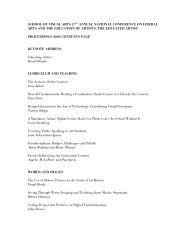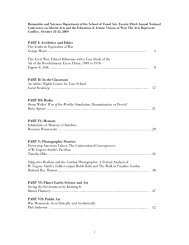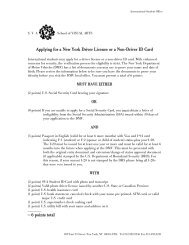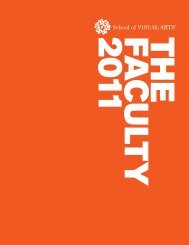SECTION 1 - via - School of Visual Arts
SECTION 1 - via - School of Visual Arts
SECTION 1 - via - School of Visual Arts
You also want an ePaper? Increase the reach of your titles
YUMPU automatically turns print PDFs into web optimized ePapers that Google loves.
Dreaming without lucidity <strong>of</strong> any kind, without the bio-brain system potential in memory and<br />
cognition for awareness that one has dreamt, no less is dreaming, not distinguishing between<br />
reality and the dream, these are the primitivisms <strong>of</strong> memory and cognition, operating in and<br />
dominating the psyches <strong>of</strong> our species earlier stages in bio-brain system evolution. Certainly<br />
this was the case prior to 400,000 years ago.<br />
We can assume that the evolving language in abstraction <strong>of</strong> Archaic H. sapiens, with the<br />
increased prefrontal-lobe development serving Broca’s area, and less limbic dominance in biobrain<br />
system architecture, that the dream and for that matter all imagining would begin to be<br />
remembered as something separate from the materiality <strong>of</strong> awake reality.<br />
I argue that despite our post-H. habilis progress in bio-brain system evolution, even with our<br />
species beginning to distinguish our dream and other imagining from reality, that the same<br />
limbic primitivisms in memory and cognition that dominated the less bio-brain system evolved<br />
branches <strong>of</strong> our family tree, also dominated more or less all succeeding branches through<br />
acculturation.<br />
Research leads me to conclude that acculturation in limbic traditions in cognition, in imitativememe<br />
memory, out <strong>of</strong> earlier times <strong>of</strong> minimal prefrontal bio-brain system evolution, from<br />
times before our species H. habilis development <strong>of</strong> Broca’s area, through some 3 million plus<br />
250,000 years after, from generation to generation, from branch to branch <strong>of</strong> our species family<br />
tree, has subverted our species progress in abstraction in memory and cognition.<br />
Educational experiments asserting the further potential in abstraction <strong>of</strong> the chimpanzee,<br />
teaching the chimpanzee to sign confirms this.<br />
The history <strong>of</strong> our species stasis in fulfillment <strong>of</strong> the potential in cognition and memory<br />
inherent to each <strong>of</strong> our stages in bio-brain system evolution bears out the role <strong>of</strong> culture and<br />
acculturation as the subverting factor. The fact is that through the millions <strong>of</strong> years <strong>of</strong><br />
evolving prefrontalness and potential in abstraction our species has preferred to remain limbic<br />
dominant in memory and cognition, inhibiting development <strong>of</strong> the inherent potential in<br />
memory and cognition in abstraction <strong>of</strong> each <strong>of</strong> our species stages in evolving bio-brain system<br />
hardware.<br />
It is this millions <strong>of</strong> years <strong>of</strong> culture and acculturation that today in their continued limbic<br />
dominance, obstructs development <strong>of</strong> memory and cognition in abstraction and in turn free-will<br />
in intellect.<br />
By placing our species cognition and memory within a larger historic perspective, we can more<br />
clearly separate out the complexity <strong>of</strong> layers that comprise the limitations and biases in memory<br />
and cognition we continue to impose on ourselves and each other, through the culture and art<br />
we create and experience.<br />
We should remind ourselves daily that our memory and cognition has had this up hill battle<br />
within all our species bio-brain system stages in evolution, since our beginning some 6 million<br />
years ago. It was then that we first took the fork in the road away from our Chimpanzee cousin,<br />
bringing with us in traditions <strong>of</strong> cognition their memory with all its cultural dead ends.<br />
27








